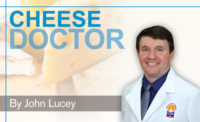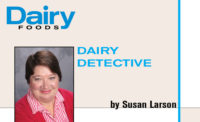
Gone are the days when consumers walking down the grocery store aisle simply looked at the traditional four P’s of marketing: product, price, place, and promotion. Today, people are reflecting more often on their food choices and how those choices impact the world around them — with growing concerns over climate impacts and the environment.
Many individuals, along with institutional and commercial foodservice and retail buyers, are choosing foods for their perceived long-term impact on the environment. Tetra Pak’s Consumer Environmental Trends Report 2020 found that over 78% of the world’s consumers are concerned about the environment, and the International Food Information Council's 2020 Food and Health Survey revealed that one-third of consumers consider environmental sustainability when shopping.
The dairy community has made significant strides in improving climate-smart practices to reduce their environmental footprint — progress that should be celebrated. At the same time, it is important to broaden the definition of sustainability beyond just protecting planetary health to include addressing the health of people and communities. These efforts are essential as dairy foods, and many animal-sourced products are facing increased opposition from the plant-based foods movement.
Animal and plant foods should not be thought of as competing entities but rather as synergistic food sources that provide different though complementary nutritional, social, economic, and environmental benefits.
Sustainable nutrition model poses opportunity
For some people, the word “sustainability” refers solely to environmental concerns, but that narrow definition does not acknowledge the interconnection between the health of people and the planet. Sustainable nutrition is a more holistic approach that ensures wholesome, nutrient-dense foods are accessible, affordable, and culturally relevant while also preserving environmental resources and supporting local communities.
This approach is used by the Food and Agriculture Organization of the United Nations and the World Health Organization and embraces a framework for thinking about both people’s health and the planet.
Through the lens of sustainable nutrition, dairy foods play an important role because they are nutrient-dense, provide essential nutrients needed throughout the lifespan, and contain other diverse bioactive compounds embedded within their unique food matrix. The essential nutrients in dairy foods work together to provide multiple health benefits, including optimal growth and development in children and reduced risk of developing chronic diseases such as Type 2 diabetes and heart disease.
When sustainable nutrition is coupled with nutrition security — defined as having consistent access, availability, and affordability of foods and beverages that promote health — dairy foods are an important part of the solution to creating nutrition equity so that children, families, and communities can thrive and prosper.
Dairy farms are innovators
It is important to highlight the dairy community’s progress in innovating climate-smart farming practices. A report from University of California, Davis, concludes that the dairy industry is on target to achieve its commitment to a 40% decrease in greenhouse gas emissions by 2030 and predicts that California dairy farms will reach climate neutrality by then. These successes are a result of energy-efficient lighting, cooling, and pumping methods; solar energy; and investments in anaerobic digesters to capture and convert methane in manure to biogas for clean energy.
The amount of water used in dairy farming has decreased 88% in the last 50 years by utilizing agricultural by-products such as almond hulls in cow feed rations and reusing water four times on the farm. New programs also are using manure to improve soil quality across California’s diverse agricultural sectors.
Championing milk and dairy foods
Dairy foods bring a powerful nutritional profile and significant progress in environmental stewardship, yet the dairy community is challenged by advocates for plant-exclusive eating patterns, who are making significant progress in schools, restaurants, and healthcare environments. School meals are a focus of efforts to adopt plant-based eating patterns since schools offer a significant opportunity to impact students’ daily food choices. Advocating for the role of milk and dairy foods in school meals is critical, as consumption of these foods during school years is linked not only to improved health but also to academic achievement.
The focus on sustainability isn’t going away, and it shouldn’t, but the definition of sustainability is evolving and expanding. The dairy community can help shape the future of sustainability by broadening the conversation to include sustainable nutrition. The Dairy Council of California is focused on advancing milk and dairy foods’ unique and essential contributions to healthy, sustainable eating patterns, but this work can’t be done alone. Dairy farmers, processors, and marketers all have a role to play. Working together will help ensure that consumers consider the progress of dairy farmers and processors in climate action, as well as the unmatched nutritional components of dairy foods.
Visit HealthyEating.org to learn more about how to get involved.




